London, March 7 (Reuters) - A global standard setter for voluntary carbon projects has recently approved three new methods that focus on reducing emissions by transitioning to cleaner fuels in household cookstoves. This move aims to enhance the credibility of the carbon credits generated by such projects.
Carbon trading allows companies to purchase credits from initiatives that mitigate emissions, like promoting cleaner cooking fuels or preventing deforestation. This approach is viewed as a means for wealthier nations to fulfill their emission reduction targets while supporting developing countries in transitioning to sustainable energy and enhancing their resilience against climate change.
In 2023, the global voluntary carbon market was valued at approximately $723 million, according to Ecosystems Marketplace data.
Advocates for cookstove initiatives emphasize not only the reduction of emissions from burning kerosene or coal for cooking but also the associated health benefits stemming from decreased exposure to air pollution in households.
Critics, however, caution that these programs tend to overstate their emission reduction impact.
To address concerns and ensure transparency, the Integrity Council for the Voluntary Carbon Market (ICVCM) has introduced Core Carbon Principle (CCP) standards. The council is rigorously evaluating the legitimacy of carbon offset projects, particularly emphasizing the recently approved clean cookstove methodologies, which demand a stringent approach to establish the baseline fuel being replaced and to monitor usage. This will mitigate the risk of over-issuing carbon credits.
Amy Merrill, CEO of the ICVCM, highlighted that this measure will instill the necessary confidence for carbon financing to flow into these initiatives, allowing them to deliver their societal, environmental, and health benefits globally.
The ICVCM anticipates a substantial project pipeline that will update their approaches to align with the new standards, potentially resulting in the issuance of hundreds of thousands of credits in the upcoming year.
Moreover, the ICVCM also sanctioned a household bio-digester, a sealed unit designed to convert household waste like food scraps into a usable cooking fuel.
